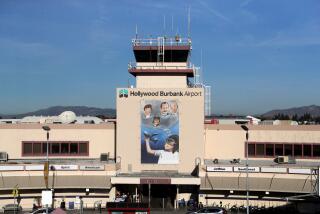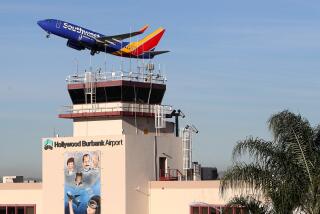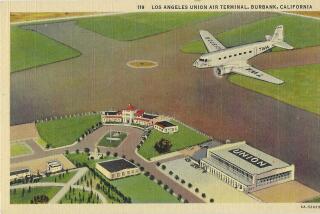Who Wins the Fight for Public Opinion?
- Share via
From most of the 20th century, the perception has been that public relations is the poor stepchild in the marketing mix. From the 1920s, with the rise of the modern public relations practice, until the 1980s, corporate America saw public relations professionals as tacticians, primarily there to write press releases on company events. But that perception is rapidly changing.
Over the last decade, public relations has increasingly become the preferred weapon in the battle of public opinion. And it’s not just in corporate America but also with former adversaries such as lawyers. Public relations professionals are being brought in to provide strategic counsel on public campaigns to company heads and senior lawyers.
The Burbank Airport fight over terminal expansion is a case study of how competing law firms have brought in heavy hitters from public relations and spent more than a million dollars to fight not only in the courts but also in the court of public opinion.
The Burbank-Glendale-Pasadena Airport Authority has long sought to expand the number of gates at Burbank to accommodate increased passenger usage. Attorney Richard Simon, whose law firm--McDermott, Will & Emory--has represented the airport authority for years, brought in the public relations firm Sitrick & Co. because he was frustrated that the airport’s legal victories were often portrayed in the media as defeats.
On the other side, the Burbank City Council, which seeks to stop the expansion, hired attorney Peter Kirsch from the law firm Cutler & Stanfield in 1995. A year later, he brought in the public relations firm Winner & Associates to counter the airport authority’s firm. According to published articles, both public relations firms spent major sums of money last year, and there is still a long fight ahead.
Who will come out the winner? Probably the public relations firms and the winning law firm.
Managing legally driven issues is a hot and growing field for public relations firms. It is not unheard of for top public relations professionals to charge $250 to $400 an hour, basically the same as those top lawyers.
*
In the crowded legal arena, public positioning and legal punditry are growing in popularity. Many attorneys have found that winning in court is not enough if in newspapers and television--the court of public opinion--it is perceived that they lost because the other side talked to the media and framed the story to meet its interests.
For years, lawyers and public relations pros had uneasy relationships because attorneys did not want to divulge private client-attorney issues, even in crises, whereas public relations professionals wanted to get the facts out to the media. This has changed because companies and public entities understand that they have to communicate with the public to gain a positive reputation.
*
In the Burbank Airport situation, the public relations agencies have been brought in to help the law firms fight that reputation battle. I would disagree with Burbank City Councilman Ted McConkey, who was quoted in a recent newspaper article: “Every time they get a favorable editorial or story in one of the newspapers,” he said, “they believe the battle is won. The courts are the place this is going to be won or lost, not in the newspapers.”
Being a politician, McConkey must understand that a good public reputation is his No. 1 asset. The same is true in the airport case: Favorable press that one side receives on a legal issue will be remembered long after the trial is over.
So far, neither side has done a great job of communicating a lasting vision of who is right. In this kind of public battle, with millions of dollars at stake, the winner will be the side that strategically frames the debate, wins over public opinion and wins the trial. One thing is certain: Public relations has entered a new era of respectability and that is the reason for the larger budgets and strategic roles.
More to Read
Inside the business of entertainment
The Wide Shot brings you news, analysis and insights on everything from streaming wars to production — and what it all means for the future.
You may occasionally receive promotional content from the Los Angeles Times.










